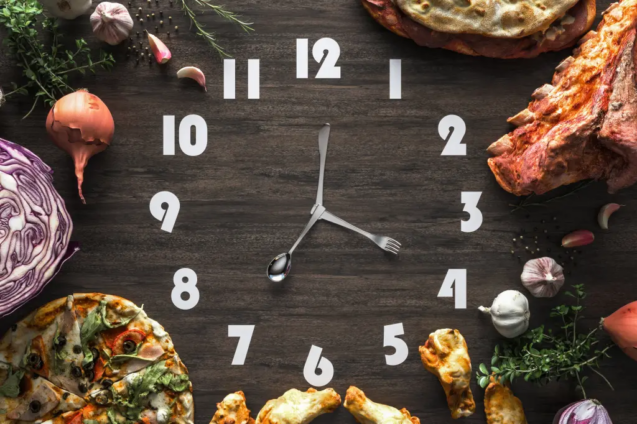It’s time to put a fork in your late-evening eating habits. A study from the University of Sorbonne in Paris, France found that people who ate dinner after 9 p.m. may have an increased risk of suffering from a stroke or mini stroke.
The study of 100,000 people, published in Nature Communications, occurred over seven years. Each of the participants tracked their meal times on weekdays and weekends and researchers monitored their risk of cardiovascular disease.
Over the seven years, a third of participants ate their dinner before 8 p.m. and another third after 9 p.m. In that time frame, 2,000 people suffered complications of cardiovascular disease, including heart attack and stroke.

Those who dined after 9 p.m. were 28% more likely to suffer stroke. In fact, for every hour after 8 p.m. that someone ate their dinner, their chances of having a stroke or a transient ischemic attack (TIA), in which blood supply to the brain is only briefly interrupted, increased by 8%.
A TIA is a period of a few minutes during which people have similar symptoms to that of a stroke, but it doesn’t cause permanent damage. Around 1 in 3 people who suffer a TIA will have a full-blown stroke, according to the Mayo Clinic.
Eating late creates risks because digesting food later raises both blood sugar and blood pressure, the researchers explained.
Higher evening blood pressure potentially damages blood vessels over time and raises the risk of heart attack or stroke.
That said, people who ate dinner after 9 p.m. didn’t see the same coronary heart risk as with stroke.
Researchers found that women were more affected by late dining hours than men, noting that women also made up 80% of the study cohort.
“Like many people, my grandmother used to warn me not to have dinner too late, and this study suggests there may be some sense in that advice,” Bernard Dour, the senior author of the study said.
“Now we are a 24/7 society, where people feel they never have enough time, many of us often eat later at night,” Dour added. “But people who eat dinner late because they think they are too busy to do so earlier may increase their risk of health problems, although this is seen more in women, and we need more research to confirm these findings.”
On the other hand, men’s health appeared to be more closely tied to the morning. For every hour after that a man ate breakfast, his risk of coronary heart disease rose by 11%, while the rate of all genders was 6%.
The study also found that fasting overnight had health benefits, especially among those who ate dinner early. For every extra hour that someone fasted in the evening, their risk of stroke or TIA decreased by 7%.
So is there a perfect time to eat? Some seem to think so.
“Eating [your last meal] between 5 to 7 p.m. would be ideal,” Dr. Dana Cohen, integrative medicine specialist and co-author of “Quench,” told Prevention. “However, the later it gets the less food you should consume.”

A study published last year in Cell Metabolism learned that people who ate meals at 5 p.m. burned more calories than people who ate dinner later.
However, it appears as though the length of time people leave between their dinner and sleep is a key factor. What people eat is also just as important as when people eat, according to one expert.
Kayla Kopp, a registered dietician at Cleveland Clinic’s Center for Human Nutrition, told Fortune that people prone to acid reflux or heartburn or who suffer from type 2 diabetes might want to have an earlier dinner. As a rule of thumb, people should eat four hours before they go to sleep and they shouldn’t go more than three or four hours during the day without eating.
“The clock does not determine how our bodies utilize or store food,” Kopp said.
She said food impacts the body’s circadian rhythm and sleep and optimal sleep is important for health.
“Your circadian rhythm does play a large role when it comes to hunger cues,” explained Kopp. “Because of this, it is best to try to consume breakfast, lunch and dinner on a consistent, regular basis every day without skipping meals.”
Latest Stories
-
Painter and sculptor B. Acheampong turning his passion for art into profitable venture
19 minutes -
Presidential lodge, RM residency in Ashanti region left to rot away
34 minutes -
Herty Corgie highlights the essence of gratefulness in ‘My Gratitude’
2 hours -
ANNOUNCEMENT: Joy FM temporarily goes off air January 11
3 hours -
Yango honored with two titles at the Technovation Africa Awards 2024
3 hours -
Aowin Traditional Council declares war on illegal mining with spiritual intervention
3 hours -
Leadership must ensure equity for all citizens, regardless of faith – Asiedu Nketiah
3 hours -
Prof. Alex Manu appointed Executive Director at Centre for Social Justice
3 hours -
Imminent changes within some key security agencies, state institutions, and its implications
3 hours -
There are more women than men, but there’s a man for every woman – Rev. Nana Yaa
4 hours -
Nii Kwei releases ‘The Praise Medley’, a celebration of God’s goodness
4 hours -
Mistakes in team composition can be costly, pray for us – Fifi Kwetey appeals to Ghanaians
4 hours -
Mahama forms 5-member Hajj task force to cut pilgrimage costs
4 hours -
Fuel shortage hits Sissala East and West Districts
4 hours -
President Mahama orders immediate probe into 2020 and 2024 election fatalities
5 hours

